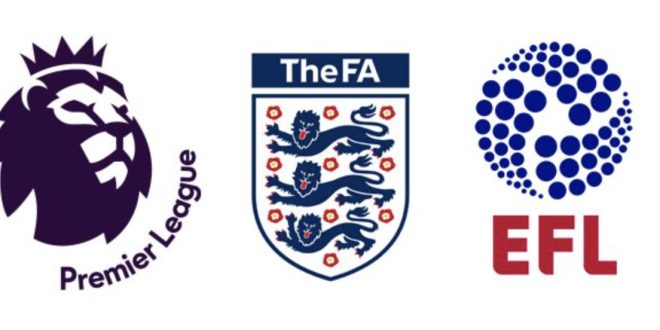English football will adopt a new Code of Conduct on ‘Gambling Related Agreements’, safeguarded by the FA, EFL, Premier League and Women’s Super League.
The Code, which will apply to the football authorities and clubs in the professional game, will be implemented at the start of the 2024/2025 season. Leagues and clubs must abide by the following four general principles on gambling sponsorships to ensure protection, social responsibility, reinvestment, and integrity.
The principles of the Code were agreed upon by football leagues and authorities in response to the Gambling Review, in which the government instructed football to ensure gambling is promoted in a socially responsible manner.
As stated: “Following detailed cross-sport dialogue, the following Code has been drafted by the Premier League, The English Football League, the Women’s Super League (the ‘Competitions’), and the FA as part of that commitment, to be applied across all of professional football and those matches played by clubs who are members of the Competitions.”
On application, the Code has been designed to complement existing statutory frameworks contained within the Gambling Act and all relevant provisions related to British broadcast advertising rules and marketing standards of the CAP Code.
As such, it is the responsibility of respective competitions and clubs to ensure that where they have entered into Gambling Related Agreements, in which the Gambling firms party to those agreements are aware of the Principles and standards contained within the Code.
Gambling Related Agreements will be applied to companies licensed by the UK Gambling Commission (UKGC) or companies licensed via a ‘white label partnership.’ Should a Gambling Related Agreement be undertaken with a company that is not licensed by the UKGC, the agreement must comply with the relevant requirements under the Gambling Act 2005 related to advertising and ‘unlawful gambling.’
As such, football clubs and competitions must ensure that the gambling sponsorships adhere to the four general principles:
Protection: “To protect children and other vulnerable persons, gambling sponsorship must be specifically designed to limit its reach and promotion to those under the age of 18 (Children) and those at risk of gambling-related harm.”
The Code applies new club and competition principles on protection to minimize the exposure of gambling sponsorships in stadiums and during match days and that promotion remains limited on club websites and social media channels.
Social Responsibility: “Gambling sponsorship must be promoted and delivered in a socially responsible way. This includes ensuring that education and awareness messages are provided as part of all marketing activities.”
The Code will implement specific provisions on social responsibility, including that clubs offer player counseling on gambling addiction and risks, and establish appropriate channels for stakeholders to raise concerns about any Gambling Related Agreements.
Reinvestment:” The commercial income raised from gambling sponsorship must be reinvested back into infrastructure and programmes that serve football fans and communities. This includes investment in staging strong competitions, improving infrastructure such as stadiums and training facilities, and providing community and grassroots participation opportunities for local communities. “
Principles on reinvestment detailed that gambling sponsorship funds must be safeguarded for activities delivered by associated charitable organizations, for the public benefit to promote participation in sport and advance social development.
Integrity: Gambling sponsorship must not compromise the integrity of football competitions nor harm the welfare of those participants who take part in them.
Clubs and competitions must ensure that staff and athletes are informed on The FA’s betting rules, which prohibit betting directly or indirectly on football matches or competitions worldwide and betting on wider markets related to football. Education programmes should be provided, including specific programmes tailored for younger footballers within Club Academies, as measures aim to maintain the integrity of football across all levels of competition.
Leagues and authorities will provide a complaint process for those who believe the Code has been violated, consisting of two stages:
- Stage One: The submission of a direct complaint to the competition or club.
- Stage Two: For escalated complaints to be forwarded to the Independent Football Ombudsman (IFO).
All competitions and clubs must disclose their Gambling Related Agreements and adhere to the Code. An annual statement detailing adherence to the Code must be published and include: a.
The statement must include ; Clear examples of work conducted by Competitions and Clubs to help support adherence to the Code; and c. Details of any instances where a Competition or Club has been found to not adhere to the Code.
As determined: “English Football is committed to ensuring that gambling sponsorship is undertaken in a socially responsible manner, and that the output of Gambling Related Agreements is suitably reinvested back into football and its communities.
“The Code recognises that the relationship between gambling and football must be conducted responsibly to protect supporters from gambling-related harm, as well as wider communities linked to football clubs across the country.”
From the 2026/27 season, Premier League clubs will face a ban on contracts with bookmakers and gambling companies. As a result, many operators and clubs are looking to capitalize on the two remaining years. For clubs, such agreements are a valuable source of income, especially in an era when the league strictly adheres to its Profit and Sustainability Rules (PSR).
This summer, several deals between Premier League clubs and gambling operators took place: Leicester City cooperates with BC.GAME, Crystal Palace – with Neet88, Wolverhampton – with DE.BET and BetMGM, while Tottenham Hotspur limited themselves to an agreement with BetMGM, Southampton signed with Rollbit. And in the spring, Betano and Aston Villa signed a sponsorship agreement.
Don’t forget to subscribe to our Telegram channel!
